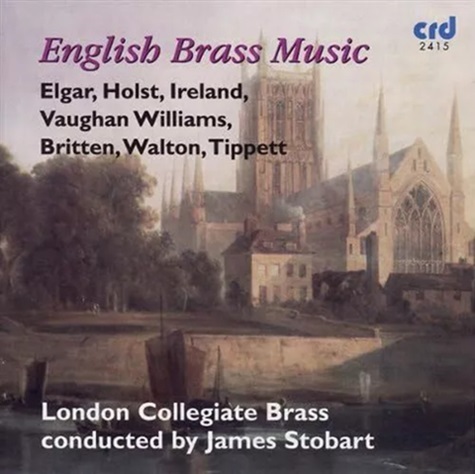

London Collegiate Brass
Conductor: James Stobart
CRD 2415
This welcome double CD re-release, originally from 2005, brings together two mid 1980s recordings (with excellent sleeve notes) from the pioneering brass ensemble.
Formed as City of London Brass in 1972 under Geoffrey Brand, they enjoyed further artistic acclaim led by Edward Gregson. By the time of these recordings their ability to embrace the modern and traditional genres of brass band writing within their textural weave of orchestral instrumentation was well established.
A 1974 LP release combined Thomas Wilson with Langford, Holst and Gregson, whilst ‘Cataclysm’ (1981) contrasted Paul Patterson and Adrian Cruft with Gilbert Vinter and Chris Hazell. A third album under Stobart featured works by George Lloyd and Wilfred Josephs.
The releases (neither with a formal name) were directed by James Stobart, the founder of the New Cantata Orchestra of London, who for several years had been associated with the Locke Brass Consort.
Clarity and balance
The first recording (1985) featured Elgar, Vaughan Williams, Holst and Ireland, sound engineered with wonderful clarity and balance at Rosslyn Hill Chapel in Hampstead by the renowned Bob Auger (who also recorded Stobart with the Locke Brass Consort).
Stobart draws his performances on a wide, elegant canvas, both tonally and in inflection from what would be considered ‘authentic’ brass band readings.
‘Henry V’ is a considered ‘into the breach’ portrait, with ‘Comedy’, like a John Betjeman poem in its observation of urban London life, lined with a slightly bitter, sardonic aftertaste.
‘The Severn Suite’ (in the Geoffrey Brand arranged version) is stately and noble, the visions of Worcester water colours of reflection rather than oily intensity. So too ‘A Moorside Suite’, which has a purposeful delicacy; a cantering ‘Scherzo', ghostly ‘Nocturne’ and jaunty ‘March’.
‘Henry V’ is a considered ‘into the breach’ portrait, with ‘Comedy’, like a John Betjeman poem in its observation of urban London life, lined with a slightly bitter, sardonic aftertaste.
Fluidity
The 1986 recording from Morley College in London sees Stobart bring fluidity to Walton, Tippett, Britten and Ireland - bolder and more forthright in expression.
‘The First Shoot’ is decorous, although still capturing the sense of knowing, self-deprecation found in Osbert Sitwell’s ballet plot – the seemingly never-ending inter-war days of sunny delusion that Churchill was to later describe as the ‘locust years’.
‘The First Shoot’ is decorous, although still capturing the sense of knowing, self-deprecation found in Osbert Sitwell’s ballet plot – the seemingly never-ending inter-war days of sunny delusion that Churchill was to later describe as the ‘locust years’.
What followed consigned them to history. Britten’s ‘Russian Funeral Music’ (premiered in 1936 under the committed communist Alan Bush before the full horrors of Stalin’s regime were revealed) now seems somewhat misplaced in intention, the music a portent of the human cost of War. Stobart treats the score with informed appreciation.
Telling immediacy
A lost era is also recalled with ‘A Downland Suite’ drawn with broad pastoral expressionism as well the ‘indoor elegance’ in a performance of tenderly defined character.
It sits in fine contrast to the telling immediacy and modern classicism of Tippett’s ‘Festal Brass with Blues’, a work which also has a political relation to his own ‘Third Symphony’ and Beethoven’s ‘Ninth Symphony’.
Stobart ensures that it retains a resonant presence, its character questioning to the end.
Iwan Fox
To purchase:
https://www.crdrecords.com/product/english-brass-music/
https://www.wyastone.co.uk/english-brass-music.html
Play list:
Disc 1:
1. The Severn Suite (Edward Elgar)
2. Overture, Henry V (Ralph Vaughan Williams)
3. A Moorside Suite (Gustav Holst)
4. A Comedy Overture (John Ireland)
Disc 2:
1. The First Shoot (Sir William Walton)
2. Festal Brass with Blues (Sir Michael Tippett)
3. Russian Funeral for Brass and Percussion (Benjamin Britten)
4. A Downland Suite (John Ireland)









